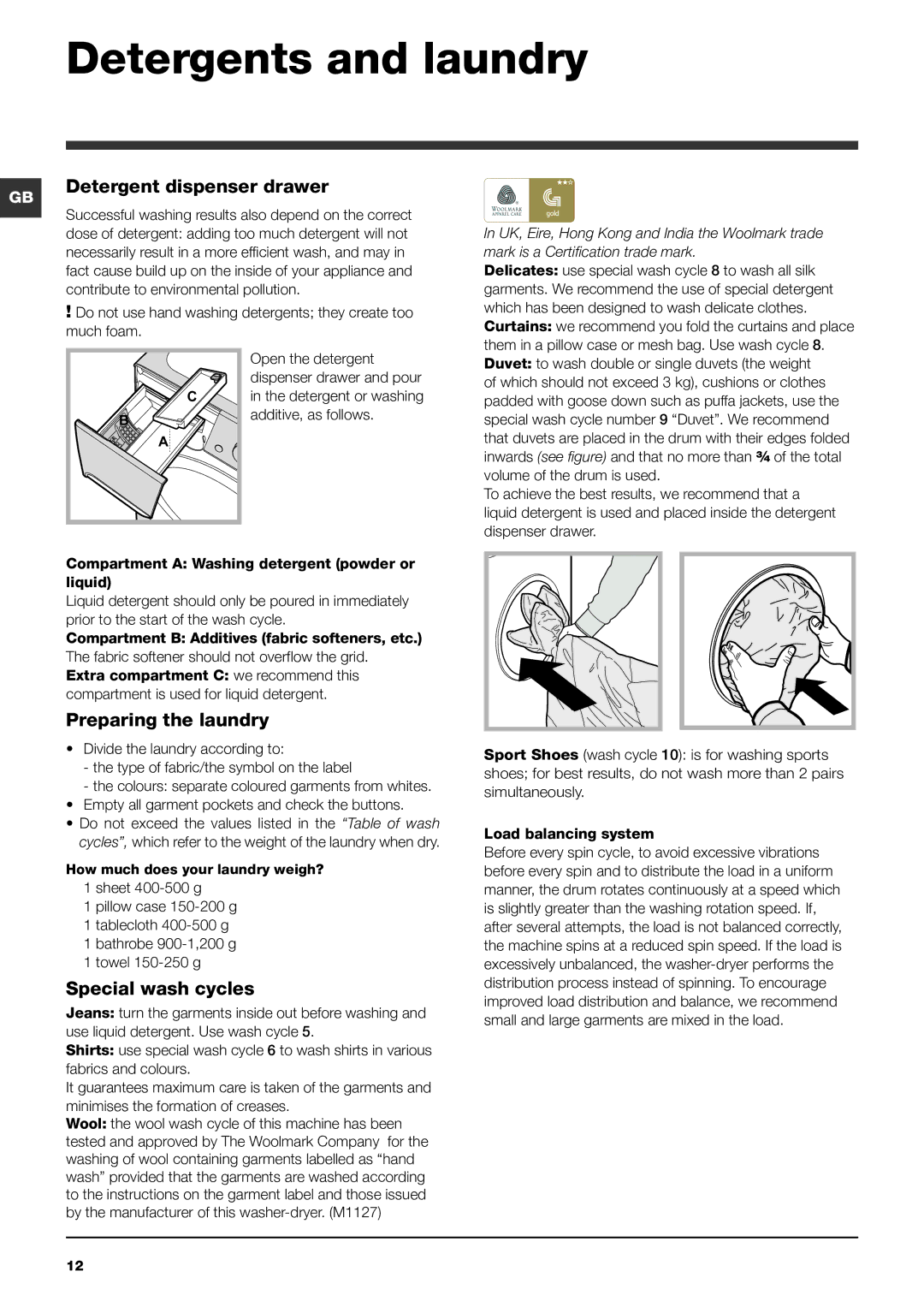
Detergents and laundry
| Detergent dispenser drawer | |
GB | ||
Successful washing results also depend on the correct | ||
| ||
| ||
| dose of detergent: adding too much detergent will not | |
| necessarily result in a more efficient wash, and may in | |
| fact cause build up on the inside of your appliance and | |
| contribute to environmental pollution. | |
| ! Do not use hand washing detergents; they create too | |
| much foam. |
In UK, Eire, Hong Kong and India the Woolmark trade mark is a Certification trade mark.
Delicates: use special wash cycle 8 to wash all silk garments. We recommend the use of special detergent which has been designed to wash delicate clothes. Curtains: we recommend you fold the curtains and place them in a pillow case or mesh bag. Use wash cycle 8.
C |
B |
A |
Open the detergent dispenser drawer and pour in the detergent or washing additive, as follows.
Duvet: to wash double or single duvets (the weight of which should not exceed 3 kg), cushions or clothes padded with goose down such as puffa jackets, use the special wash cycle number 9 “Duvet”. We recommend that duvets are placed in the drum with their edges folded inwards (see figure) and that no more than ¾ of the total volume of the drum is used.
To achieve the best results, we recommend that a liquid detergent is used and placed inside the detergent dispenser drawer.
Compartment A: Washing detergent (powder or liquid)
Liquid detergent should only be poured in immediately prior to the start of the wash cycle.
Compartment B: Additives (fabric softeners, etc.) The fabric softener should not overflow the grid.
Extra compartment C: we recommend this compartment is used for liquid detergent.
Preparing the laundry
•Divide the laundry according to:
-the type of fabric/the symbol on the label
-the colours: separate coloured garments from whites.
•Empty all garment pockets and check the buttons.
•Do not exceed the values listed in the “Table of wash cycles”, which refer to the weight of the laundry when dry.
How much does your laundry weigh?
1 sheet
1 pillow case
1 tablecloth
1 bathrobe
1 towel
Special wash cycles
Jeans: turn the garments inside out before washing and use liquid detergent. Use wash cycle 5.
Shirts: use special wash cycle 6 to wash shirts in various fabrics and colours.
It guarantees maximum care is taken of the garments and minimises the formation of creases.
Wool: the wool wash cycle of this machine has been tested and approved by The Woolmark Company for the washing of wool containing garments labelled as “hand wash” provided that the garments are washed according to the instructions on the garment label and those issued by the manufacturer of this
Sport Shoes (wash cycle 10): is for washing sports shoes; for best results, do not wash more than 2 pairs simultaneously.
Load balancing system
Before every spin cycle, to avoid excessive vibrations before every spin and to distribute the load in a uniform manner, the drum rotates continuously at a speed which is slightly greater than the washing rotation speed. If, after several attempts, the load is not balanced correctly, the machine spins at a reduced spin speed. If the load is excessively unbalanced, the
12
